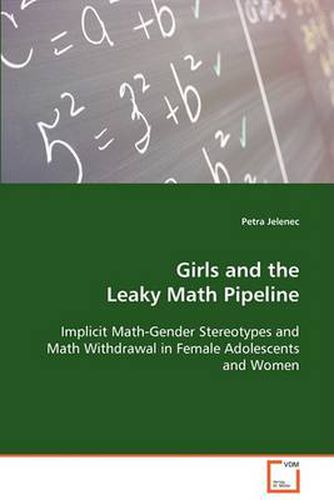Readings Newsletter
Become a Readings Member to make your shopping experience even easier.
Sign in or sign up for free!
You’re not far away from qualifying for FREE standard shipping within Australia
You’ve qualified for FREE standard shipping within Australia
The cart is loading…






This title is printed to order. This book may have been self-published. If so, we cannot guarantee the quality of the content. In the main most books will have gone through the editing process however some may not. We therefore suggest that you be aware of this before ordering this book. If in doubt check either the author or publisher’s details as we are unable to accept any returns unless they are faulty. Please contact us if you have any questions.
Women are still underrepresented in math-intensive fields like computer science or engineering. Math-gender stereotypes have been identified to diminish both math performance and math interest in women. Petra Jelenec investigated implicit math-gender stereotypes in children and adolescents with Implicit Association Tests (IATs) and Go/No-Go Association Tasks (GNATs). In a large German sample, implicit math-gender stereotypes could be detected predominantly in girls. Girls at the age of 9 years already revealed implicit math-gender stereotypes, and for adolescent girls, those implicit stereotypes were related to academic outcome variables like ability self-concepts and school grades in math and German. Further, implicit math-gender stereotypes turned out to be context-dependent. Female university students showed a stronger implicit math-male bias after completing a difficult math test that was described in a stereotypical manner. This book is intended for readers interested in implicit social cognition and stereotype research.
$9.00 standard shipping within Australia
FREE standard shipping within Australia for orders over $100.00
Express & International shipping calculated at checkout
This title is printed to order. This book may have been self-published. If so, we cannot guarantee the quality of the content. In the main most books will have gone through the editing process however some may not. We therefore suggest that you be aware of this before ordering this book. If in doubt check either the author or publisher’s details as we are unable to accept any returns unless they are faulty. Please contact us if you have any questions.
Women are still underrepresented in math-intensive fields like computer science or engineering. Math-gender stereotypes have been identified to diminish both math performance and math interest in women. Petra Jelenec investigated implicit math-gender stereotypes in children and adolescents with Implicit Association Tests (IATs) and Go/No-Go Association Tasks (GNATs). In a large German sample, implicit math-gender stereotypes could be detected predominantly in girls. Girls at the age of 9 years already revealed implicit math-gender stereotypes, and for adolescent girls, those implicit stereotypes were related to academic outcome variables like ability self-concepts and school grades in math and German. Further, implicit math-gender stereotypes turned out to be context-dependent. Female university students showed a stronger implicit math-male bias after completing a difficult math test that was described in a stereotypical manner. This book is intended for readers interested in implicit social cognition and stereotype research.